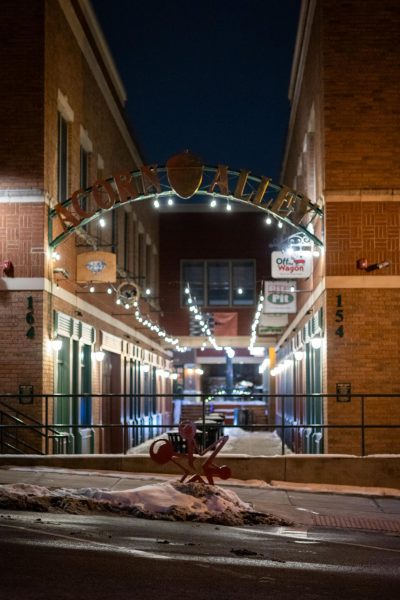How do you define courage?
March 17, 2010
Elyas came over with a shot of Harak for me. I noticed he dumps his shot right into his Goldstar beer and I wondered why. “The alcohol here is weak compared to the drinks we have back in Sudan,” he said. Perhaps it also helps with his uneasy nerves.
I slammed back my shot and chased it with the cool lager of Goldstar. Elyas grabbed a cigarette out of his pocket and brought it to his mouth. The pub had a dim light to it and his cigarette illuminated an orange glow on his dark face.
The tears that trickled down his sun beat face shattered my innocent soul as he told me about the rebels that attacked and destroyed his village or how hard it was to leave his family or hearing the guns fire at him as he crossed the Egyptian border into Israel.
I was leaning back on my futon, sipping a glass of wine this past weekend when I suddenly thought of my friend, Elyas. It was a rush of my consciousness that suddenly landed on the thought of him. It was a dichotic thought. I was enjoying a warm night, feeling the hope of spring while at the same time thinking of Elyas, whom has lived an unimaginable life compared to my own. Our last time together was watching a documentary on Darfur in his small apartment in Tel Aviv, Israel — his pervading smile hidden in the trenches of misery. My complaints are incomparable to his.
Perhaps it was the story my mother had told me earlier that elicited this memory. She told me about her cousin’s husband, Paul, who had escaped the Stalinistic regime of Mátyás Rákosi in Hungary with his four brothers. They crawled through fields and hopped security fences, leaving their father and mother behind. He would eventually become a professor at Cleveland State University; but, as I remember from my youth, he was always disconnected from the past and thus was never fully able to live in the present.
And so these were the thoughts and stories ruminating through my mind as I looked up to the twinkling stars of Orion’s Belt. They were stories of great despair — leaving one’s family and homeland, experiencing violence and oppression.
Stories that resided in my semantic memory, disconnected from personal experience. But they were also stories of great courage — of knowing when to leave, knowing how to say good-bye and knowing who to trust.
For myself, then, what would I do in a situation like that? Would I have the courage to leave? Or would I have the courage to stay and fight? Which is more courageous, staying or fighting? For Paul’s mother to tell her children to leave and never return is courageous love. For my friend Elyas, hopping the border as a Muslim African into Israel, the Jewish homeland that has been perpetually at war since its birth with the Muslim Middle East, is courageous trust. How did he know he would be okay there? To have courage, do you also need to have trust and love? To have courage, do you also need to know when to put down your arms?
Life takes courage in all respects. Will you have the courage to study art because it is your passion? When you graduate, will you have the courage to seek all opportunities even if they take you away from the comforts of your family and your home? More importantly, with the desperate and, at times, overwhelming reality of this world — the social injustices on the street corners of Akron to the ideological wars of misunderstanding across the world — will we, as vivacious young students, have the courage to stand up and say this is enough? I hope so.
In an age of Hollywood films that advocate killing and big weapons, shooting ranges and Tea Baggers, courage has lost its virtuous definition to the materialistic dreams of America. Courage isn’t something you hold onto like a gun in a holster. Courage is a hidden human strength outside the logic of reason. Both Elyas and Paul did not seek glory when they told their stories or even sympathy. They told these stories because it was their life. Perhaps courage, then, is best defined by the lives we each live, not by the glory of the gun. How do you define courage?
David Busch is a senior psychology and history major and columnist for the Daily Kent Stater. Contact him at [email protected].
























